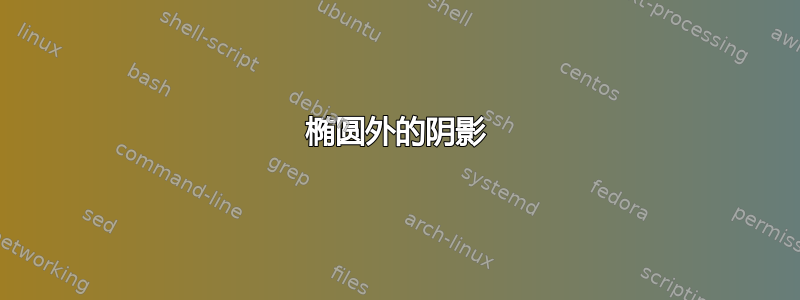
这与我发布的另一个问题相关(圆形和椭圆形周围的阴影)。由于我只得到了部分答案,所以我想发布一个更具体的提问,看看是否能弄清楚其余的问题。
我有一组非线性方程组,可以得出椭圆内有一个圆。可行区域在圆内和椭圆外。我在上一个问题中找到了圆内阴影的满意答案,将在下面的答案中显示。
我还想将结果扩展到椭圆外部的阴影。我想说清楚,对周围的矩形(整个轴)使用填充绘制是行不通的(因为我已经能够实现它),因为它会给轴数字留下“模糊感”。
我更愿意在 axis 环境中工作,并保持函数定义不变。这将为将来的示例提供一种更灵活的方法。
本质上,线性方程组的解决方法是在轴的顶部或底部创建一条路径,并在 fillbetween 中使用它们。我希望在这里得到类似的结果。
下图显示了我当前的图片。您可以看到提到的“模糊”。我希望该区域不被阴影覆盖。
\documentclass[border=10pt]{standalone}
\usepackage{amsmath,amsthm}
\usepackage{tikz,pgfplots} %for graphics
\pgfplotsset{compat = newest} %to run newest version
\usepgfplotslibrary{fillbetween}
\usepackage{xcolor}
\begin{document}
\pagestyle{empty}
\pagecolor{green}
\begin{tikzpicture}
\begin{axis}[
xmin=-6, xmax=6, ymin=-6, ymax=6,
axis lines=middle,
ticklabel style={font=\tiny},
xtick = {-5,-4,...,5},
ytick = {-5,-4,...,5},
xlabel = \(x\),
ylabel = \(y\),
legend style={legend pos=north east,font=\tiny}
]
\addplot[name path = A,
domain=-pi:pi,
samples=200]({5*sin(deg(x))}, {3*cos(deg(x))});
\addlegendentry{\(\frac{x^{2}}{25} + \frac{y^{2}}{9} = 1\)}
\addplot[name path = B,
domain=-pi:pi,
samples=200]({3*sin(deg(x))}, {3*cos(deg(x))});
\addlegendentry{\(x^{2} + y^{2} = 9\)}
\path[name path = C] (0,0) -- (0,0);
\addplot[only marks,black] coordinates {(0,3) (0,-3)};
\filldraw[blue!70,opacity=0.4] (-6,-6) rectangle (6,6);
\filldraw[green,opacity=0.4] (0,0) ellipse (5 and 3);
\addplot[blue!70,opacity=0.4] fill between [of=B and C];
\end{axis}
\end{tikzpicture}
\end{document}
答案1
如果你不想让填充覆盖轴,那么请使用选项axis on top。无需使用图层(显式)opacity或fillbetween。
\documentclass[tikz, border=1cm]{standalone}
\usepackage{pgfplots}
\pgfplotsset{compat=1.18}
\begin{document}
\begin{tikzpicture}
\begin{axis}[
xmin=-6, xmax=6,
ymin=-6, ymax=6,
axis lines=middle,
ticklabel style={font=\tiny},
xtick={-5,-4,...,5},
ytick={-5,-4,...,5},
xlabel=\(x\), ylabel=\(y\),
legend style={legend pos=north east, font=\tiny},
axis on top,
]
\fill[green!40, even odd rule]
(current axis.south west) rectangle (current axis.north east)
plot[domain=-pi:pi, samples=50, smooth] ({5*sin(deg(\x))}, {3*cos(deg(\x))}) -- cycle
plot[domain=-pi:pi, samples=50, smooth] ({3*sin(deg(\x))}, {3*cos(deg(\x))}) -- cycle;
\addplot[domain=-pi:pi, samples=50, smooth]({5*sin(deg(x))}, {3*cos(deg(x))});
\addlegendentry{\(\frac{x^{2}}{25} + \frac{y^{2}}{9}=1\)};
\addplot[domain=-pi:pi, samples=50, smooth]({3*sin(deg(x))}, {3*cos(deg(x))});
\addlegendentry{\(x^{2} + y^{2}=9\)}
\addplot[only marks] coordinates {(0,3) (0,-3)};
\end{axis}
\end{tikzpicture}
\end{document}
答案2
也许使用图层和剪辑会适合您:
\documentclass[border=10pt]{standalone}
\usepackage{amsmath,amsthm}
\usepackage[dvipsnames]{xcolor}
\usepackage{pgfplots}
\usepgfplotslibrary{fillbetween}
\pgfplotsset{compat=newest}
\pagecolor{Dandelion!20}
\begin{document}
\begin{tikzpicture}
\begin{axis}[
xmin=-6, xmax=6, ymin=-6, ymax=6,
axis lines=middle,
ticklabel style={font=\tiny},
xtick = {-5,-4,...,5},
ytick = {-5,-4,...,5},
xlabel = \(x\),
ylabel = \(y\),
legend style={legend pos=north east,font=\tiny},
layers/my layer set/.define layer set={
pre main,
main}{},
set layers=my layer set,
]
\addplot[
name path=A,
domain=-pi:pi,
samples=200
]({5*sin(deg(x))}, {3*cos(deg(x))});
\addlegendentry{\(\frac{x^{2}}{25} + \frac{y^{2}}{9} = 1\)}
\addplot[
name path=B,
domain=-pi:pi,
samples=200
]({3*sin(deg(x))}, {3*cos(deg(x))});
\addlegendentry{\(x^{2} + y^{2} = 9\)}
\path[name path = C] (0,0) -- (0,0);
\addplot[only marks,black] coordinates {(0,3) (0,-3)};
\addplot[blue!30] fill between [of=B and C];
\begin{pgfonlayer}{pre main}
\clip (-6,-6) rectangle (6,6) (0,0) ellipse (5 and 3);
\fill[blue!30] (-6,-6) rectangle (6,6);
\end{pgfonlayer}
\end{axis}
\end{tikzpicture}
\end{document}





